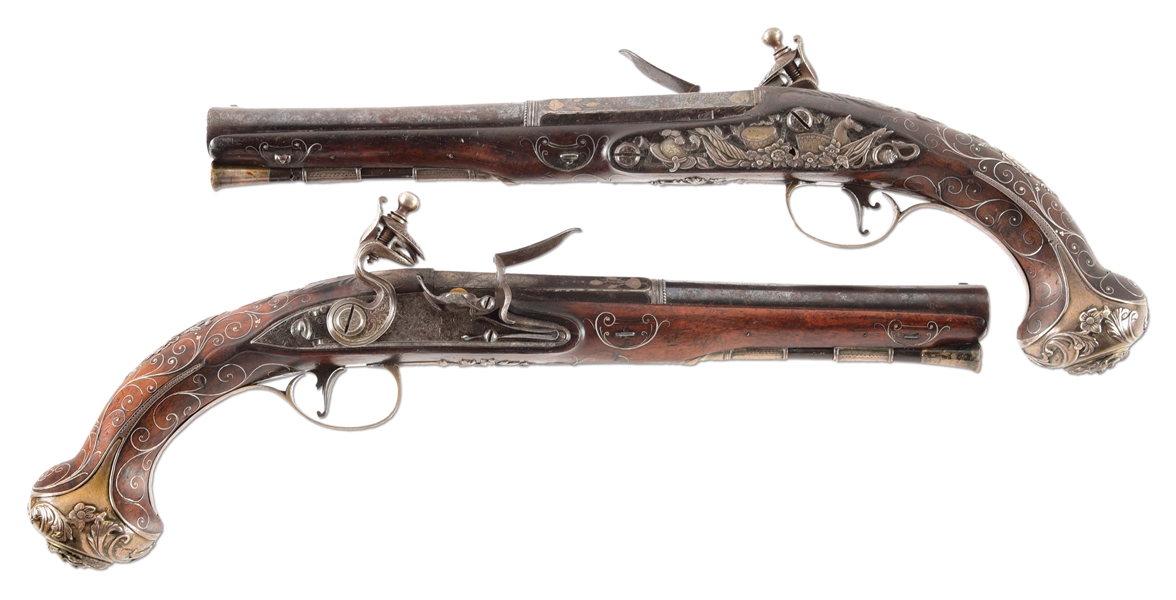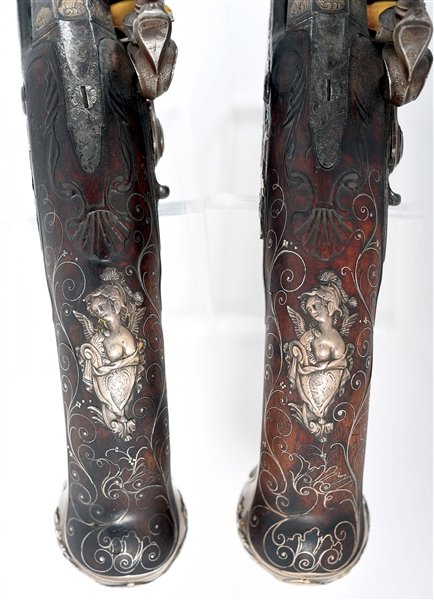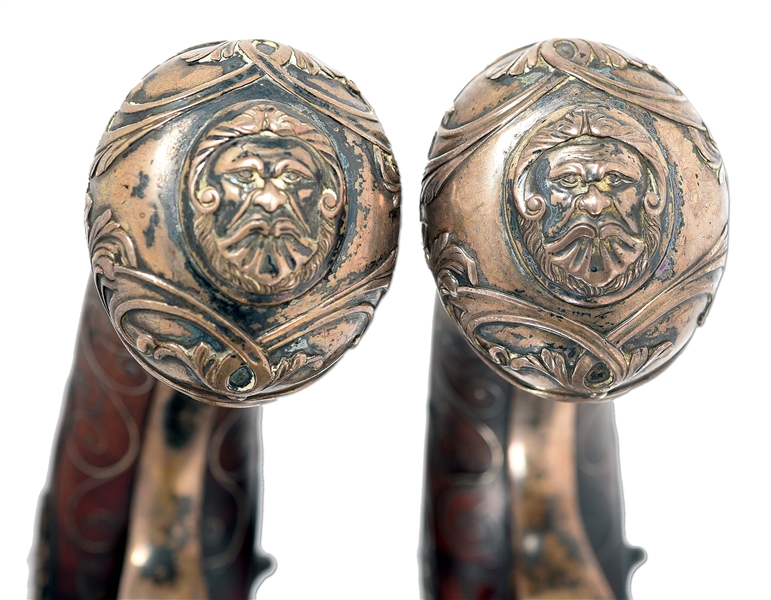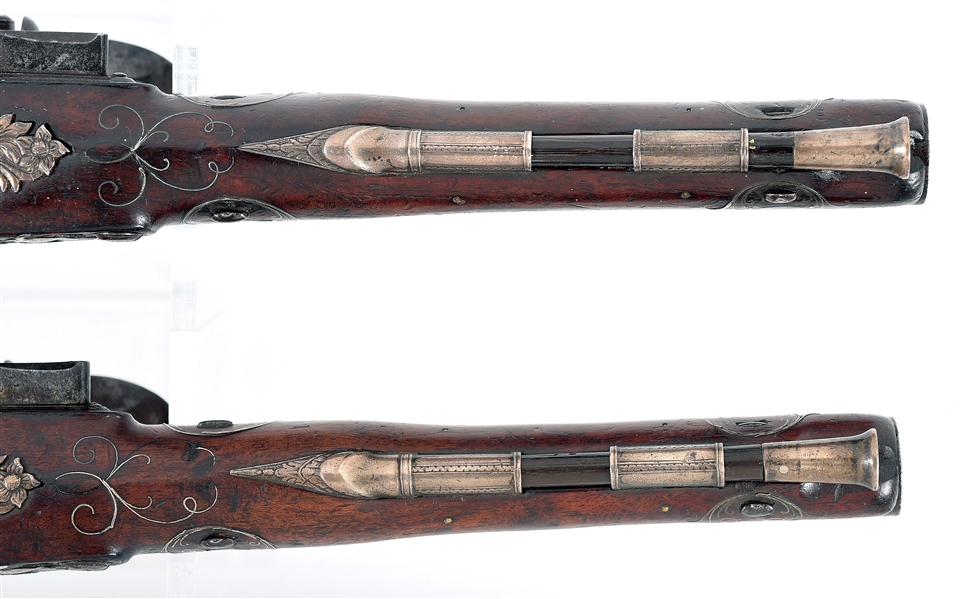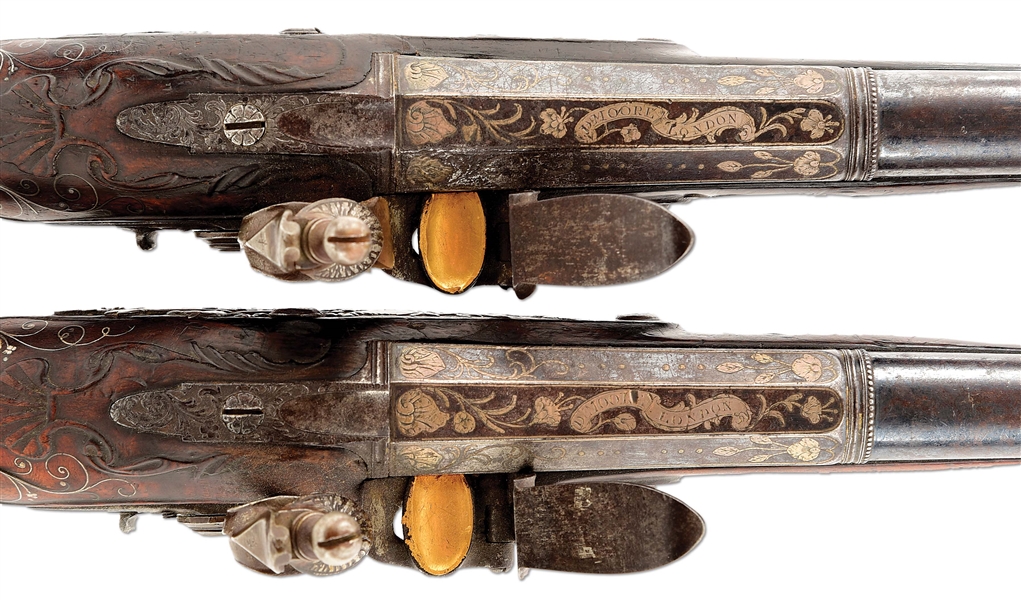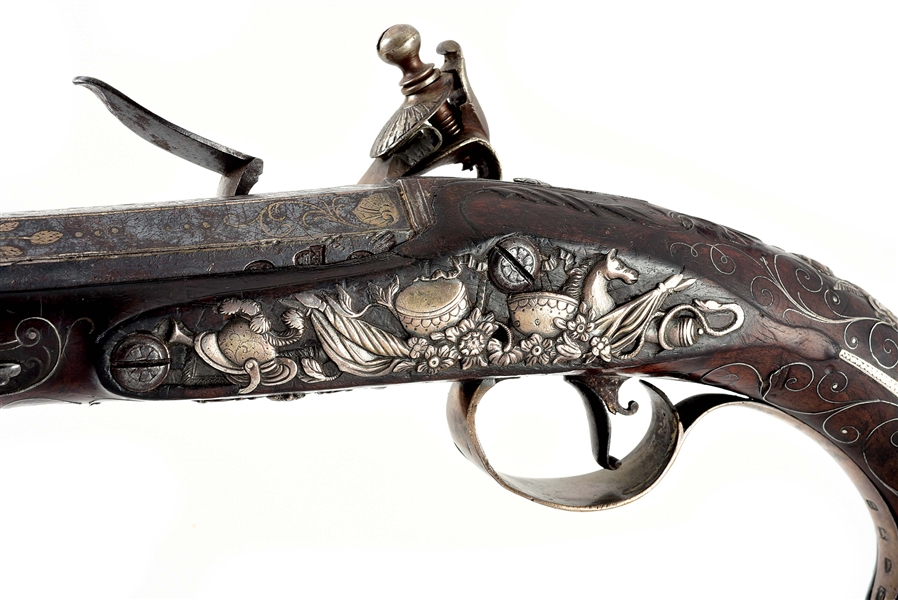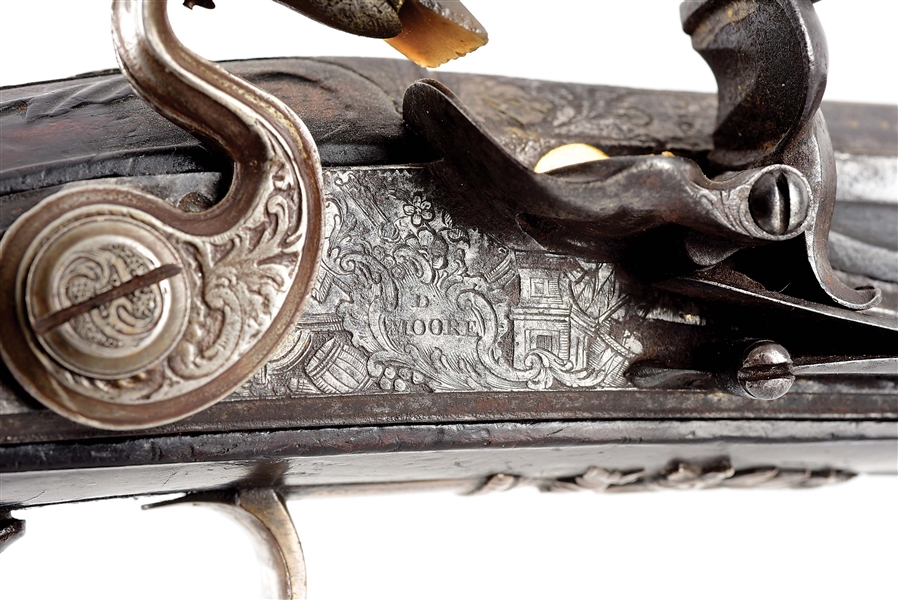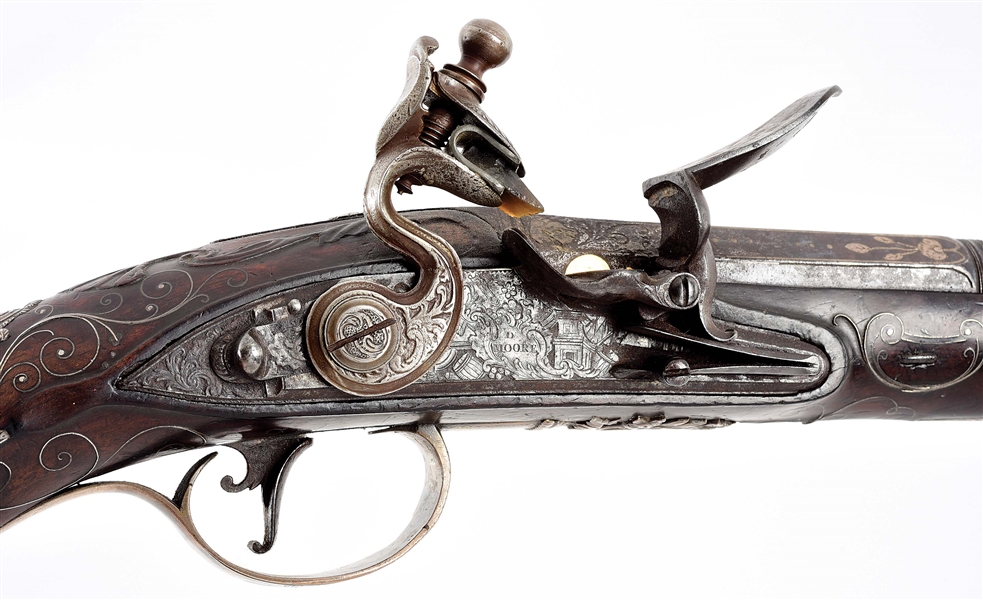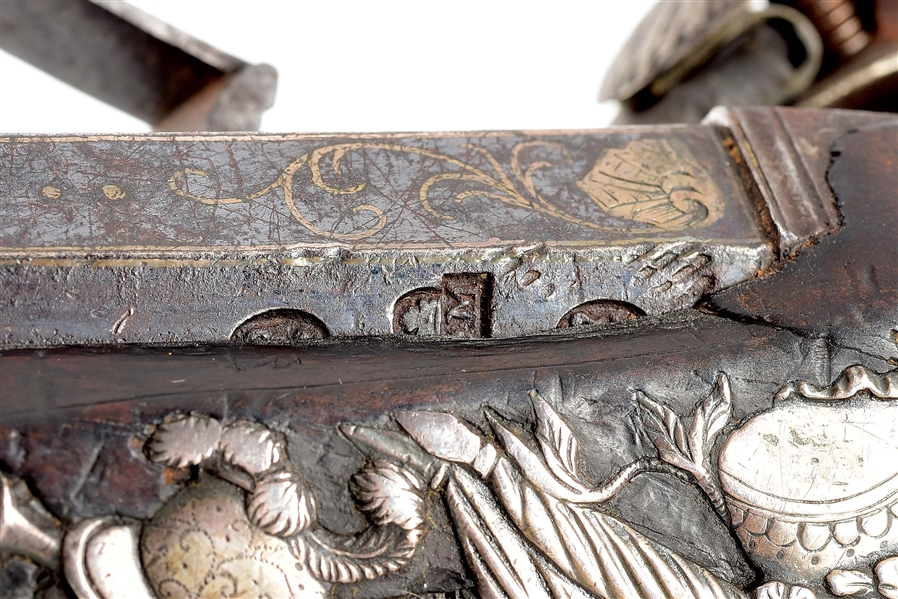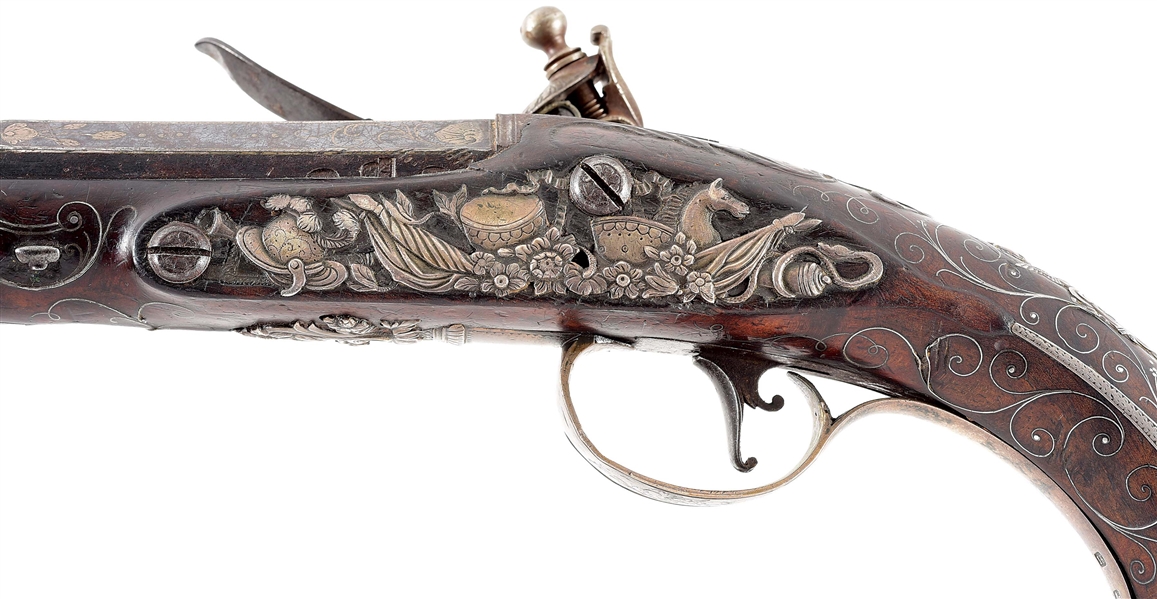
Patriot Pistols
(A) STUNNING, NEVER PUBLICLY OFFERED, PAIR OF DANIEL MOORE PRESENTATION PISTOLS WITH SOLID SILVER MOUNTS BY JOHN KING, OWNED BY EDWARD LLOYD IV, "THE PATRIOT", DELEGATE TO THE CONTINENTAL CONGRESS
Daniel Moore is recorded in Stockel as being active circa 1758-1800 after he was declared a master in 1758; Gunmakers of London by Blackmore expands on this, indicating that he apprenticed to John Markby starting in 1746, free of the company in 1756, proof piece and mark in 1758, and was the Furbisher for the Tower of London in 1754; he was recorded in 24 Fenchurch Street and 34 Lime Street circa 1767-1775, and began working for the East India Company circa 1790. This magnificent pair of pistols was owned by Edward Lloyd IV, also known by the epithet "The Patriot". Lloyd was born on December 15th, 1744 to Edward Lloyd III (with his own epithet of "The Councilor") and Ann Lloyd, nee Rousby. Lloyd IV was born at the original Wye House and, while details about his adolescence and his young adult life are scant, when he came of age undertook the management of the estate and expanded into the newly enlarged world of politics, cutting his teeth at the same time as the infamous Stamp Act. In 1771, after the General Assembly was prorogued by Governor Robert Eden, Lloyd became a member of the Lower House, a position he held until 1776; in 1777 he sat on the Assembly's Executive Counsel until 1779, and between 1781-1791 was the State Senator for Eastern Shore. In 1783 and 1784, he also served as a delegate to Congress and represented Talbot County at the Constitutional Convention of 1788. Edward Lloyd also made significant strides in cementing early American culture, purchasing an unfinished mansion from Samuel Chase and finishing it into the Chase-Lloyd house, still visible today in Maryland and is listed on the National Register of Historic Places and designated a National Historic Landmark in 1970; the Wye House was similarly designated as a National Historic Landmark and registered in the National Register of Historic Places in 1970. During the Revolution, Lloyd was also impressive, with his actions in the colonial militia earning him the rank of Colonel, aiding the formation of the Association of Freemen of Maryland (his signature is visible in the first column of The Declaration of the Association of Freemen of Maryland), and election to the Council of Safety. During the Revolutionary War he acquired his "The Patriot" epithet. After the war he served as a senator from 1786-1791; his death in 1791 terminated his second sitting. Lloyd also was responsible for the Wye House as it stands today, with a group of British looting and burning the house in 1781. Lloyd rebuilt the house, which is believed to be very near the original site. Lloyd died July 8th 1796, and is buried in the family cemetery, where his tombstone still stands. This pair of pistols, in identical configuration, are magnificent with half-octagonal half-round barrels separated by a wedding ring decorated with a beaded band and retained by a pair of keys. Silver spider front sights. Octagonal section of barrel is decorated with inlaid silver, with shell motifs over the breach and florals behind the wedding band. "D. MOORE LONDON" is engraved in a ribbon. Left side of barrels have deeply struck proofs that are partly obscured by the stock, but appear to be Moore's DM poincon and English proofs; due to the condition of the pistols we have elected to leave the barrel keys in place. Striking sideplate with pieced work depicting a finely detailed horse, a snake wrapped around a cannon (possibly a reference to the famous rattlesnake motif favored by early Americans), a pair of drums, a bed of flowers, a flag, and a helmet (which superficially resembles the Cromwellian lobstertail helmet); lock screws are connected via flowing silver cloth strips. Stepped lock with English push-on safeties signed in center "D. MOORE" with detailed engraving of a building (Wye House?) florals, a keg, and a flag. Cocks are replaced by William Bankard with two stories related regarding the cocks: in the notarized affidavit Elizabeth Schiller (10th generation Lloyd) says that the cocks were broken by children in the past. In a letter from Martin Urner, dated 1991, he relates a different story told to him by Harry Berry, who originally acquired them from the Wye House, that the pistols were damaged circa 1814 when the British were in Maryland and confiscating weapons that could be used against them. While Lloyd IV had already passed at this point, the pistols occupied a revered status in the family, and the family implored the British to not seize the pistols; the officer allowed the pistols to stay but broke the hammers off to prevent their possible use. Gold touchhole and gold lined pan. Stock is intricately inlaid with silver wire throughout, with vacant areas along sides of stock between keys. Silver trigger guard with a swirl of florals with an detailed floral finial and silver hallmarks along the tang consisting of "I · K", lion passant, a leopard head, and the letter "K", indicating manufacture by John King in 1765. Tang with a scalloped cut is engraved with floral scroll on a finely stippled ground and surrounded by a relief shell carving. Detailed thumbpiece depicting the winged victory (Nike), with a engraved lion rampant, the arms of the Lloyd family. Flared butt with silver cap depicting a relief grotesque surrounded by floral and baroque scroll. Ramrods with silver heads retained by a single ferrule with wrigglework decoration and feeding into a reinforced mouth with wrigglework and a pointed finial. Another pair of Daniel Moore pistols with silverwork attributed to possibly being John King is in the Metropolitan Museum of Art, accession number 32.75.136–.137, from the collection of Giovanni Morosini with significantly less decoration. CONDITION: Excellent, as retrieved from the Wye House by Berry. Metal is dark, with some spotted oxidation visible on one lock. Flashes of the original high polish English bluing is visible on barrels, intermixed with chocolate and gunmetal grey. Some light oxidation to top of tips of muzzles, worst spot being approximately 1/8" x 1/2". Silver has appropriately tarnished with age. Stocks are excellent with some indentations and handling marks; one very small crack at barrel key. No visible chips. Silver wire is lifting in a few spots, with some very minor strands missing. Mechanically fine, bores are excellent with a minimum of oxidation; some very mild corrosion around touchholes. PROVENANCE: Edward Lloyd IV, Wye House by descent to Elizabeth Schiller, Harry Berry, to Dan Hartzler. PAPERWORK: This fantastic piece is accompanied by a detailed folder of information including an inventory sheet detailing these pistols; detailed photos; an affidavit on Wye House letterhead signed by Elizabeth Schiller, witnessed by Marion Smith, and notarized by Nellie Lantz, dated 1989; handwritten letter from Martin Urner describing his relationship to Harry Berry and a story regarding the broken cocks; a copy of the inventory sheet of Edward Lloyd IV's possessions; a photocopy of The Gun Report, vol. 36 no. 11, April 1991, showing a detailed article on these pistols by Dan Hartzler; a photocopy of the page from "Maryland Longrifles" by Daniel Hartzler and James Whisker where these pistols are photographed; a letter from Arron W.E. Capel regarding these pistols and their potential disposition (particularly advising on the 50% death tax on estate), and their winning of a first place pistol display. This is a truly incredible pair of pistols and opportunities to purchase pistols with this level of decoration, provenance, and condition is a extremely rare as most examples are in museums; this opportunity to own them, being the first time that these pistols have been offered publicly, may be your only chance before they are institutionalized. EMW
